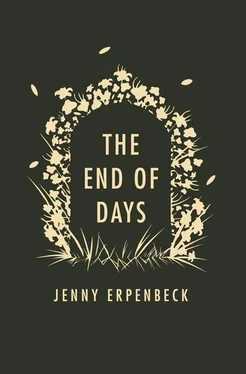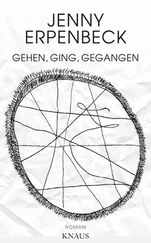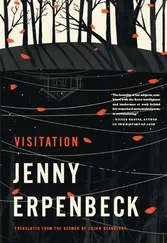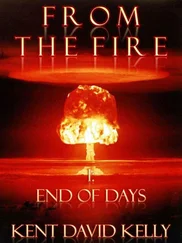Jenny Erpenbeck - The End of Days
Здесь есть возможность читать онлайн «Jenny Erpenbeck - The End of Days» весь текст электронной книги совершенно бесплатно (целиком полную версию без сокращений). В некоторых случаях можно слушать аудио, скачать через торрент в формате fb2 и присутствует краткое содержание. Год выпуска: 2014, Издательство: New Directions Publishing, Жанр: Современная проза, на английском языке. Описание произведения, (предисловие) а так же отзывы посетителей доступны на портале библиотеки ЛибКат.
- Название:The End of Days
- Автор:
- Издательство:New Directions Publishing
- Жанр:
- Год:2014
- ISBN:нет данных
- Рейтинг книги:4 / 5. Голосов: 1
-
Избранное:Добавить в избранное
- Отзывы:
-
Ваша оценка:
- 80
- 1
- 2
- 3
- 4
- 5
The End of Days: краткое содержание, описание и аннотация
Предлагаем к чтению аннотацию, описание, краткое содержание или предисловие (зависит от того, что написал сам автор книги «The End of Days»). Если вы не нашли необходимую информацию о книге — напишите в комментариях, мы постараемся отыскать её.
The End of Days — читать онлайн бесплатно полную книгу (весь текст) целиком
Ниже представлен текст книги, разбитый по страницам. Система сохранения места последней прочитанной страницы, позволяет с удобством читать онлайн бесплатно книгу «The End of Days», без необходимости каждый раз заново искать на чём Вы остановились. Поставьте закладку, и сможете в любой момент перейти на страницу, на которой закончили чтение.
Интервал:
Закладка:
In 1909 my family relocated to Vienna. Prolonged adversity spurred me to become politically active for the first time at age fourteen, spearheading an anti-war demonstration in 1916. Since I had not yet benefited from Marxist schooling, it was merely an outpouring of pacifist sentiment that prompted my resistance.
In her first account of her life, written as part of her visa application, she had gone on at this point, writing: . but my resistance arose out of a passionate hatred of the war. Was the birth of the Soviet Union in 1917 not also identical with the decision on the part of the Bolsheviks, alone among all the peoples of the world, to autonomously cast off the burden of this inhuman war, despite the enormous sacrifices this required?
If the world revolution had succeeded in those days, the uniting of the proletarians of all countries would have been not only the start of a new world but also of an eternal peace. What cause could people possibly have to slaughter one another? What cause could the Austrians have to make the Italians bleed, what cause the Germans to slit open the French? None at all.
To be sure, there had been peace in 1918, but the European borders were not dissolved, they were only pushed this way and that. On the other hand, everything outside the Soviet Union, the border between those who worked and those who lived off others’ labor, remained right where it was. Ever since the start of this miserable peace nearly twenty years ago, the young Soviet power stood all on its own against a united front of European reactionaries — in a new war, the Soviets would be not one enemy among others, but the sole enemy. And this war would surely not be long in coming. From where she sat today, she cast a critical glance at the young peace-loving girl she once had been. She had understood even then that there was a difference between the blood that flowed during a revolution and the blood that was spilled in a war. She also knew that all wars are not created equal.
After the end of the war and my father’s death, still working in complete political isolation, I began to write antimilitaristic articles that I submitted to the Workers’ Journal — unsuccessfully at the time — while also writing my first novel, Sisyphus.
She wasn’t just politically isolated back then — she was completely alone. And lonely. But she doesn’t write that. Still, something that at the time was nearly her undoing proved to be a blessing in disguise: recently she heard that the man she’d once almost killed herself over was a longstanding member of a Trotskyist group. He’d been known as W. back when she first met him, then she encountered him again as Comrade E. at an assembly, and later — like so many of them, herself included — he had meandered through various identities, becoming Za., whose articles she sometimes read, later going by P. when he was in hiding, as a comrade once told her, but she hadn’t known what name he’d been using recently for his work in Leningrad. Over the past few months she’d occasionally heard mention of the Trotskyist, Zinovievist, and Bukharinist Lü., but it never occurred to her to suspect this was the same man she’d once been so in love with. Only a few weeks ago, when she happened to see a photograph of a defendant named Lü. in the newspaper, she had recognized him.
I demand.
During the Spanish Civil War.
An unacceptable.
Where I was, not at a congress.
I must object most vigorously.
In the trenches.
Could also have taken a different path.
When F. tried to pin the blame on me.
And since then never again. I demand.
Delayed detonation, surely you can.
Why all this beating around the bush?
Lü., his closest friend.
With me? Never!
This beating around the bush.
Br., just one.
F. is sowing suspicions.
Cannot work like this.
Not in the hinterlands!
A functionary who writes on the side, not an author.
A clear path.
I ask myself why Br. is not presenting an argument.
And I ask myself why F. is unleashing his cynical.
Taken into consideration as well.
Why is F. so intensely pessimistic?
Have any of you. how two-faced?
Neither a productive nor a constructive.
Br.’s sectarianism to closer scrutiny.
Rather, on the contrary, quite harmful.
Just look at the introduction and the sentences altered in the Russian version.
That isn’t true.
The introduction is.
That isn’t true!
Not forward-thinking.
Empty allegations and underhanded.
The introduction is not the same.
Do you mean to claim.
I’m not alleging anything, I’d just like. it’s not the same as in the Russian version.
Do you mean to claim that.
Nothing more to say on the subject.
Declare my resignation.
I too lay down my post.
Why don’t we just go ahead and dissolve.
Perhaps we should.
I really have nothing more to say on the subject.
We might in fact in the presence of.
A reprimand might be.
But not in the presence of.
Why in the world?
Of a Party representative.
Leave me out of it.
During this period I supported myself by working at a stationery shop. In none of these accounts has she written that she often used to nap during her lunch hour on the paper-filled shelves in the back room of this small shop. The cousin who owned the shop had given her permission. The large sheets of paper were fresher than any bedsheet, and just as if she were getting into bed, she always took off her shoes before she filed herself away in one of these compartments. She was constantly tired during those first few months when she was no longer living with her mother and sister, constantly tired because she was spending her nights writing her novel. She had so often wished for her father to return to life, and perhaps she succeeded, perhaps her words did bring him back to life again, assuming they were the right words.
Several times a quiet young man had purchased red paper from her, then asked her to cut it to leaflet size right there in the shop with the big cutting machine. Silently, he had watched her set up the machine and then turn the big crank to slice through an entire stack of paper at one go. I first made contact with the Communist Party of Austria through Comrade G. At some point she had spotted a wayward handbill, now printed, lying in the gutter, and had recognized its color. She picked up the leaflet and began to read.
Comrade G. didn’t come into the shop again all summer, but when he appeared in September, he looked at her not with two open eyes but only one and a half. He now resembled the enormous weary lizard that had been put on display in the Schönbrunn Menagerie, one of the few post-war acquisitions.
While he was standing beside her at the cutting machine, watching her arrange the stack of paper, she asked:
An accident?
Someone knocked me down and beat me.
Really?
A soldier.
A soldier?
Yes.
Why?
The putsch.
She’d read about it. On Hörligasse, a handful of Communists had even been killed, but here in the Alser District, life had gone on as before.
And your eye?
It won’t stop watering.
I’m sorry.
While she was cranking the wheel that pressed the stack of paper together, it occurred to her that from now on it would never again be possible to tell for sure whether this quiet man perhaps had reason to weep, or whether it was just his eye shedding tears on its own.
Читать дальшеИнтервал:
Закладка:
Похожие книги на «The End of Days»
Представляем Вашему вниманию похожие книги на «The End of Days» списком для выбора. Мы отобрали схожую по названию и смыслу литературу в надежде предоставить читателям больше вариантов отыскать новые, интересные, ещё непрочитанные произведения.
Обсуждение, отзывы о книге «The End of Days» и просто собственные мнения читателей. Оставьте ваши комментарии, напишите, что Вы думаете о произведении, его смысле или главных героях. Укажите что конкретно понравилось, а что нет, и почему Вы так считаете.












